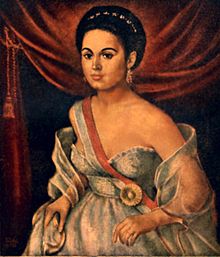 |
I had really wanted to read a book dealing with South America in the early part of the nineteenth century, and I really did not want to read "The General in His Labyrinth" by Gabriel Garcia Marquez. Friends who had read the book hadn't been enthusiastic, and I was thought that Marquez's novel, which mostly depicts the nightmarish voyage of the dying Bolivar's attempted voyage home, would be more soporific than illuminating. Surprisingly, there isn't that much available--either in English or in Spanish--and this novel by Jaime Manrique had mostly positive reviews.
Bolivar, of course, was one of the great figures of the 19th century. Born in a wealthy Venezuelan family which had been established in the New World for two centuries, he was inspired by the revolutions in the United States and in France to break free of Spanish control. His training at a military academy was instrumental in his success in liberating most of the northern part of South America from Spanish rule; he then established a new country which he called Gran Colombia, with Bogota as its capital. Within a fairly short time, the various countries under the new regime became restive under the Liberator's control, particularly as Bolivar did not believe that the people of South America were ready for democracy. Bolivar attempted to tighten his grip by declaring himself dictator; was eventually overthrown, and died of tuberculosis on his way back home to Caracas.

Manuela Saenz was his principle mistress for many years. Born in Ecuador as the illegitimate daughter of a Spanish nobleman, she was acknowledged as his offspring, endured the convent education typical of her class and station, ran off and was "ruined" by a young military officer while still in her teens, and was then sequestered into an unsatisfactory marriage to an English merchant. She met Bolivar after a triumphal victory procession, promptly became his mistress, and followed him in several military campaigns. In Bogota, she foiled an attempted assassination on her lover's life, thus earning her the nickname the "Liberator of the Liberator". Bolivar made no provisions for Manuela, and after his death she spent a quarter of a century in miserable destitution before dying in Peru.
Sounds like a great story--with much potential for action and thoughtful commentary on the nature of politics and power, right? I should have known better. True, one of my friends on GR had read the book, and tried to ward me off, but I was determined to read a great, sweeping novel of the Liberator. Of course, the author, Jaime Manrique, had also written a book called "Eminent Maricones: Arena, Lorca, Puig, and Me", which seemed the brashest (and most pathetic) of self-promotions, but what did I have to lose?
More than a few hours and more than a few brain cells, apparently. I'm not going to waste any more time on this book, so here is my review, taken directly from Goodreads:
"Is there anything more annoying than a man writing a romance novel...without being aware that he has, in fact, written a bodice ripper? This is a profoundly silly book that takes the lives of Bolivar and his mistress, Manuela Saenz, and reduces it to a few confused battle scenes, some chaotic political infighting, and a few frolics in the bathtub. Manrique never seems to understand his characters, or to provide them with psychological depth; Manuela comes off as the typical foot-stomping feisty heroine, devoid of introspection (or common sense), and Bolivar a wooden figure whose actions, so critical to the development of South America, are left unexplained. The two slave women's narratives, who might have added some well-needed perspective, are completely interchangeable, and serve as nothing more than a thin Greek chorus. A melancholy coda (though marred with some confused timeline shifts), when Manuela is exiled in Peru, is very well-written, and saves this from a one star. Even that is wrecked by a ridiculous ending (an homage to Carpentier, whom I discovered I don't really care for) that Manrique just can't pull off. Pity--there was--and is--a great novel to be written in the lives of the Liberator and La Saenz, but the reader won't find it here.
And yup, the sex scenes are really overwrought!"
I am going to go a bit further here. After reading the novel, I went onto HarperCollins web site and read an interview with Manrique. I was rather horrified to discover that (not surprisingly) Alejo Carpentier is his hero and model for good historical writing, and that he's writing a new historical novel, since he has caught "the bug". Most perplexing of all, he views Manuela as a true heroine. Now, there's a very disturbing scene in which Manuela authorizes the execution of a young innocent boy. We see through the reactions of her slaves that this is a poorly thought-out and despotic decision, but Manrique doesn't have the moral courage to explore this action further; he'd rather talk about Manuela's hair-tossing hotness and Bolivar's palo santo. It irks me no end when authors (I am including Julia Alvarez here, too) refuse to really explore the issues they've raised, but back away from these thorny problems and get soft-focused and vague. No, I'm more than irked; I'm outraged. Bah!
So much for falling for a pretty cover (love that Carrie Fisher Star-Wars-do!) and a poetical title; they'll get you every time. Won't someone write a good novel about this era? Please? On to the next country!
************************************************************
When I read this book, I was uncertain which country to attribute this novel to. Manrique was born in Colombia; the action of the novel moves from Ecuador, Peru, Colombia, Panama, and even Jamaica. I'm not going to dignify this bit of nonsense by counting this for any country in my challenge; let's just file it under Gran Colombia and leave it at that.
Translator--Juan Fernando Merino.
**
Two Stars
No comments:
Post a Comment